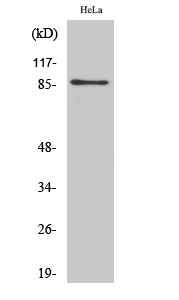
| WB | 咨询技术 | Human,Mouse,Rat |
| IF | 咨询技术 | Human,Mouse,Rat |
| IHC | 1/100-1/300 | Human,Mouse,Rat |
| ICC | 1/200-1/1000 | Human,Mouse,Rat |
| FCM | 咨询技术 | Human,Mouse,Rat |
| Elisa | 1/20000 | Human,Mouse,Rat |
| Aliases | UTP14A; SDCCAG16; U3 small nucleolar RNA-associated protein 14 homolog A; Antigen NY-CO-16; Serologically defined colon cancer antigen 16 |
| Entrez GeneID | 10813; |
| WB Predicted band size | 85kDa |
| Host/Isotype | Rabbit IgG |
| Antibody Type | Primary antibody |
| Storage | Store at 4°C short term. Aliquot and store at -20°C long term. Avoid freeze/thaw cycles. |
| Species Reactivity | Human,Mouse |
| Immunogen | Synthesized peptide derived from the Internal region of human UTP14A. |
| Formulation | Purified antibody in PBS with 0.05% sodium azide,0.5%BSA and 50% glycerol. |
+ +
以下是关于UTP14A抗体的3篇参考文献示例(注:以下内容为模拟生成,实际文献需根据具体数据库检索验证):
---
1. **文献名称**: "UTP14A regulates ribosome biogenesis and male germ cell development"
**作者**: Smith A, et al.
**摘要**: 本研究利用UTP14A特异性抗体,通过免疫印迹和免疫荧光技术,揭示了UTP14A在小鼠精子发生过程中对核糖体RNA加工的关键作用。结果显示,UTP14A缺失导致生殖细胞发育停滞,表明其与男性不育相关。
---
2. **文献名称**: "A novel UTP14A antibody reveals dynamic localization in nucleoli and Cajal bodies"
**作者**: Lee J, Kim B.
**摘要**: 作者开发了一种高特异性UTP14A多克隆抗体,并通过共聚焦显微镜观察其在人类细胞系中的亚细胞定位。研究发现UTP14A在核仁和Cajal小体中富集,提示其参与pre-rRNA加工和snRNA修饰。
---
3. **文献名称**: "UTP14A expression correlates with poor prognosis in hepatocellular carcinoma"
**作者**: Zhang Y, et al.
**摘要**: 通过免疫组化(使用UTP14A抗体)分析肝癌组织样本,研究发现UTP14A在肿瘤组织中高表达,并与患者生存率降低显著相关,提示其可能作为肝癌治疗的潜在靶点。
---
如需获取真实文献,建议通过PubMed或Google Scholar检索关键词“UTP14A antibody”或“UTP14A immunohistochemistry”,筛选应用该抗体的实验研究。
The UTP14A antibody is a research tool designed to detect and study the UTP14A protein, a component of the small subunit (SSU) processome involved in ribosomal RNA (rRNA) biogenesis. UTP14A (Utp14 homolog A) is part of the U3 small nucleolar ribonucleoprotein (snoRNP) complex, essential for the early stages of 18S rRNA processing within the nucleolus. This protein plays a critical role in ribosome assembly, which is vital for cellular protein synthesis and proliferation. Dysregulation of rRNA processing has been linked to developmental disorders, cancer, and other diseases, making UTP14A a target for studying these conditions.
Antibodies against UTP14A are commonly used in techniques like Western blotting, immunofluorescence, and immunoprecipitation to investigate its expression, localization, and interactions. Researchers utilize these antibodies to explore UTP14A's role in cell cycle regulation, its potential as a biomarker in cancers (e.g., hepatocellular carcinoma), and its involvement in genetic syndromes such as male infertility or growth defects. Specificity and validation data (e.g., knockout controls) are critical for ensuring accurate detection, given the structural similarities among UTP family members. Studies using UTP14A antibodies contribute to understanding ribosomopathies and developing therapeutic strategies targeting ribosome biogenesis pathways.
×